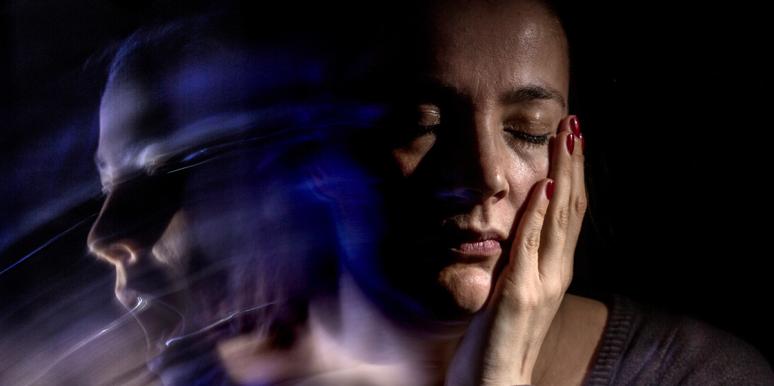The Diagnostic and Statistical Manual of Mental Disorders, Fifth Edition (DSM-5) is the latest edition of the American Psychiatric Association’s (APA) classification and diagnostic tool. The DSM-5 was published in May 2013 and includes major changes from the previous edition, DSM-IV-TR. This article provides an overview of the key changes made to the diagnosis of bipolar disorder in DSM-5.
Contents
Understanding Bipolar Disorder DSM-5
 Bipolar disorder is a mental illness that is characterized by extreme changes in mood, energy, and activity levels. These changes can be so severe that they interfere with a person’s ability to function in their everyday life.
Bipolar disorder is a mental illness that is characterized by extreme changes in mood, energy, and activity levels. These changes can be so severe that they interfere with a person’s ability to function in their everyday life.
The Diagnostic and Statistical Manual of Mental Disorders (DSM) is the standard classification of mental disorders used by mental health professionals in the United States. The DSM-IV-TR, which was published in 2000, included a category called “bipolar disorder not otherwise specified” (BP-NOS).
It is believed that bipolar disorder is underdiagnosed, so the inclusion of BP-NOS in the DSM-IV-TR was intended to increase awareness and diagnosis of the disorder.
The latest edition of the DSM, the DSM-V, was published in 2013. In this edition, the category of BP-NOS was eliminated and replaced with specific criteria for bipolar disorder. So, if you’re struggling with symptoms of bipolar, do contact a professional for an accurate diagnosis.
What Are The DSM-5 Criteria For Bipolar Disorder?
The criteria of DSM-5 for bipolar disorder are very similar to that of DSM-IV. The main difference is that the subtypes have been removed from the criteria. Bipolar I disorder is characterized by one or more manic episodes, typically followed by periods of hypomania or depression.
The symptoms of bipolar disorder can be very severe and can disrupt your life. According to DSM-5, the criteria of diagnosis include:
- A. At least one manic episode that has occurred during your lifetime.
- B. An episode of depression that has occurred during your lifetime.
- C. There has been a period of at least two weeks in which the symptoms of mania or depression were present, and these symptoms were not caused by any other medical or psychiatric condition.
- D. The symptoms of mania or depression have caused significant impairment in your ability to function in social, occupational, or other important areas of your life.
- E. The symptoms are not due to the effects of any substance (such as drugs or alcohol) or another medical condition (such as thyroid problems).
So, according to the DSM-5, bipolar disorder is diagnosed when a person has had at least one manic episode in their lifetime, along with an episode of depression. The symptoms must also cause significant impairment in functioning and cannot be due to any other medical or psychiatric condition.
If you think you may have bipolar disorder, it is important to talk to your doctor or mental health professional. And with the help of DSM-5, you will more likely to get the diagnosis and treatment that you need.
Symptoms Of Bipolar Disorder DSM-5
 It is important to note that the symptoms of bipolar disorder can vary widely from person to person. Some people may experience only a few mild symptoms, while others may have severe symptoms that significantly interfere with their daily lives. Some common symptoms of bipolar disorder according to the DSM-5 includes:
It is important to note that the symptoms of bipolar disorder can vary widely from person to person. Some people may experience only a few mild symptoms, while others may have severe symptoms that significantly interfere with their daily lives. Some common symptoms of bipolar disorder according to the DSM-5 includes:
- Elevated mood or irritability
- Decreased need for sleep
- Increased energy, activity, and restlessness
- Unusual talkativeness
- Racing thoughts
- Distractibility
- Impulsivity
- Aggressiveness
- Reckless behavior
These symptoms must be present for at least one week in order for a diagnosis to be made. It is believed that the symptoms of bipolar disorder can be triggered by a number of different factors, including stress, sleep deprivation, drug or alcohol abuse, and certain medical conditions.
For example, people with bipolar disorder may be more likely to experience symptoms during times of stress, such as during a divorce or the death of a loved one. Additionally, sleep deprivation is thought to play a role in triggering manic episodes.
Some research has also suggested that drug and alcohol abuse can trigger symptoms of bipolar disorder, particularly in people who have a family history of the condition. Additionally, certain medical conditions, such as thyroid problems or head injuries, have also been linked to an increased risk of developing bipolar disorder. If you or someone you know is experiencing symptoms of bipolar disorder, it is important to seek professional help.
Who Can Diagnose Bipolar Disorder From DSM-5?
As DSM is the manual used by clinicians to diagnose mental disorders, it is important to know who can make this diagnosis. In general, only a trained mental health professional, such as:
- Psychiatrist
- Psychologist
- Clinical social worker
Only these professionals can give you a formal diagnosis of bipolar disorder, however, your family physician may be able to give you a preliminary diagnosis and refer you to a mental health specialist for further evaluation.
So, a diagnosis is an important first step, but it is not the only factor to consider when deciding whether or not you have bipolar disorder. Other important factors include:
- Your symptoms
- How long you’ve been experiencing them
- The severity of your symptoms
- How they’ve affected your life
These are just a few things to keep in mind as you start to explore your options for treatment. If you think you may have bipolar disorder, the first step is to talk to your doctor. They can help you figure out if you need to see a mental health specialist for a formal diagnosis.
What Is The Diagnosis Procedure?
 Although bipolar disorder is often diagnosed in late adolescence or early adulthood, it can occur at any age. The diagnosis procedure for bipolar disorder generally includes:
Although bipolar disorder is often diagnosed in late adolescence or early adulthood, it can occur at any age. The diagnosis procedure for bipolar disorder generally includes:
- Clinical interview and assessment
- Review of medical records and family history
These two methods are largely used to rule out other potential causes of the symptoms and to obtain a comprehensive picture of the individual’s mental health. In some cases, diagnostic tests such as:
- Brain imaging
- Blood tests
These tests are used to rule out other potential causes of the symptoms. For instance, you might have a brain tumor or Lyme disease which can cause similar symptoms. Because bipolar disorder can be difficult to diagnose, it is important to seek professional help if you or someone you know is experiencing any of the symptoms.
What To Do After Diagnosis Of Bipolar Disorder DSM-5?
If you have been diagnosed with Bipolar Disorder DSM-V, it is important to remember that you are not alone. There are many resources available to help you manage your condition and live a full, productive life.
Here are some things you can do after receiving a diagnosis of Bipolar Disorder DSM-V:
Educate yourself about the disorder
 The more you know about bipolar disorder, the better equipped you will be to manage your symptoms and make healthy choices. There are various resources available online and in libraries that can provide you with information about the disorder. Being aware of the triggers and early warning signs of a manic or depressive episode can help you prevent or minimize them.
The more you know about bipolar disorder, the better equipped you will be to manage your symptoms and make healthy choices. There are various resources available online and in libraries that can provide you with information about the disorder. Being aware of the triggers and early warning signs of a manic or depressive episode can help you prevent or minimize them.
Join a support group
Support groups provide an opportunity to connect with others who are dealing with similar issues. Sharing your experiences and feelings with others who understand can be very helpful. It can also offer practical advice and tips for managing the disorder. So, choose as per your condition and requirements.
Talk to your loved ones
Though support groups can be an invaluable resource, talking to your friends and family about your experiences with bipolar disorder can be just as important. It can help them understand what you’re going through and how they can best support you. You may also find relief and comfort in sharing your story with others who understand what you’re going through.
Make lifestyle changes
In bipolar disorder, lifestyle changes can help stabilize your mood and improve your overall health. Some changes you may want to consider include:
- Eating a healthy diet
- Exercising regularly
- Getting enough sleep
- Avoiding drugs and alcohol
- Managing stress
Making these changes can be difficult, but they’re important for managing bipolar disorder. Work with your doctor or mental health professional to develop a plan that’s right for you.
Take medication as prescribed
Medication can be an important part of managing bipolar disorder. Be sure to take it as prescribed and talk to your doctor about any concerns you have. It is also important to let your doctor know if you are experiencing any side effects. Medications can be adjusted if necessary, make sure to discuss your condition and improvement with your doctor.
Seek therapy
 Therapy is considered an important part of treatment for bipolar disorder. It can provide support, education, and guidance on how to best cope with the symptoms of bipolar disorder. Several different types of therapy can be effective in treating bipolar disorder. These include:
Therapy is considered an important part of treatment for bipolar disorder. It can provide support, education, and guidance on how to best cope with the symptoms of bipolar disorder. Several different types of therapy can be effective in treating bipolar disorder. These include:
- Cognitive behavioral therapy
- Interpersonal and social rhythm therapy (IPSRT)
- Problem-solving therapy
Stay positive
It is a necessary trait for anyone who wants to maintain their mental health while managing bipolar disorder. A positive attitude will not only improve your mood, but it can also increase your resilience in the face of difficulties. It is also essential for developing and maintaining healthy relationships with others.
So, these are some common tips that can help you with your bipolar disorder. Remember, it is a highly individualized condition, so what works for one person might not work for another. If you need help, don’t hesitate to seek out a mental health professional. They can help you develop a treatment plan that is tailored to your specific needs.
Conclusion
In conclusion, bipolar disorder DSM-5 is a mental disorder that is characterized by extreme changes in mood. These changes can be very sudden and can last for a long period of time. If you or someone you know is experiencing these symptoms, it is important to seek professional help. Early diagnosis and treatment can make a big difference in the course of the disorder.
There are many resources available to help you learn more about bipolar disorder and how to get the help you need. So do not hesitate to reach out and get the support you deserve.
You can also get in touch with Mantra Care which is a platform that provides mental health services along with online mental health support groups. The team of professional counselors and therapists is more than happy to help you in your journey to recovery. Contact us today to learn more about our services. You can also book an online therapy session or download our free Android or iOS app.


